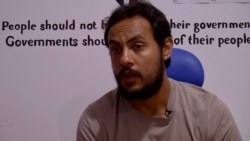TUNIS, TUNISIA — Computer student Anes Nouri wants to launch a tech startup. Awatef Mosbeh, already has one: a smart children’s magazine available via a mobile phone app and focused on environmental and social issues.
Both are holed up in a Tunis classroom one recent afternoon, staring at screens filled with a jumble of figures and letters, as they learn the basics of computer coding.
Across Tunisia, jobless youngsters, including many college graduates, squander their days in coffee shops or homes, in a country where unemployment tops 30% in some places. The sluggish economy that ignited the North African country’s 2011 Jasmine Revolution, and later provided fertile ground for recruiting extremists, continues to limp along.
Powering change
Today, a small army of young entrepreneurs is not waiting for their leaders to act. They are powering change through startups and grassroots NGOs. They are part of a broader civil society awakening since the 2011 ousting of long-time dictator, Zine El-Abidine Ben Ali.
“Our education doesn’t match market needs, so we’re creating curriculums that are market oriented and respect diversity,” says Wala Kasmi, the 32-year-old founder of the digital training program in which Nouri and Mosbeh are enrolled.
Mosbeh has a hard time finding qualified youngsters for her two companies, including the children’s magazine. “I don’t find the competencies,” she says, “and their parents are very conscious of that.”
Supported by the International Labor Organization, the digital training program targets dozens of youngsters, most of them under 35. It is part of a broader movement Kasmi launched after the revolution, dubbed Youth Decides. Today, its membership of several thousand has spread beyond Tunisia’s borders, including to neighboring Libya.
“It’s frustrating when you see young people in the streets doing nothing,” she says. “If their potential is channeled, if they belong to the right incubator, the right community of thinkers and doers, they can do a lot.”
Bread-and-butter issues top election agenda
Kasmi’s frustrations are widely shared. Jobs and other bread-and-butter concerns dominated the first round of presidential elections this month, a trend set to continue during October’s presidential runoff and legislative polls.
And they were reflected in the first-round results, with two political outsiders capturing the biggest scores — even as many establishment politicians, including Prime Minister Youssef Chahed, scored in the single digits.
“My clientele has shrunk because life is very expensive,” says Tunis butcher Arbi Bin Moustoufa, as he rolled out spicy North African merguez sausages at an outdoor market in the capital. “We need a president who lives the country’s misery, who can grow jobs and exports.”
From his cluttered office several kilometers away, 33-year-old Achref Aouadi says corruption, once confined to Tunisia’s elite in the Ben Ali era, is now widespread — even though the country has made modest progress in recent years, according to Transparency International’s Corruption Perceptions Index.
Indeed, a recent survey by US-based think-tank, the Carnegie Foundation for International Peace, finds three-quarters of Tunisians believe corruption has gotten worse since the revolution.
“You have a lot of procedures, a lot of paperwork. Just to get a license to sell alcohol you need the approval of a few ministries — which opens the door to bribery,” says Aouadi, founder of iWatch, an anti-corruption group also launched after the revolution. Like Kasmi’s movement, it has earned some international acclaim.
Shared responsibility
“I think we are all responsible,” he adds, “for failing to understand how the ecosystem works.”
iWatch filed corruption complaints against four presidential candidates, including Chahed. Only one — businessman Nabil Karoui, who placed second in the first round of voting— is currently in jail on tax evasion and money laundering allegations.
Still, the organization is getting youngsters motivated. Along with 40 full-time staff, it has recruited several hundred anti-corruption volunteers across the country. It also trains local election observers.
“I’m optimistic — a new generation is taking over and they will be the new political elite and civil society,” Aouadi says.
“There are so many young entrepreneurs,” he adds, “so many talented and especially honest activists. And you cannot stop them.”










